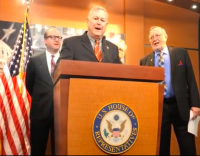The end of the year is often a time for reflection when people look back at their accomplishments over the last year; and those in the cannabis industry are no different.
2017 was a year of monumental change for the cannabis industry. Riding high on a wave of electoral victories and changing public sentiment, more states than ever have legalized cannabis in some form or fashion and nations like Canada are headed down the path of full legalization.
Part of the thanks for this seismic shift in public policy and consciousness has to go to the countless women and men who have tirelessly campaigned for cannabis reform for years; but a sizable portion of that thanks must also go towards the unsung heroes of the cannabis industry: the cannabis PR firms.
Fighting on the front-lines of the war for public perception, cannabis PR firms have been essential in the reversing decades of Reefer Madness and, through constant branding and re-branding, have helped make the cannabis industry the billion dollar industry that it is today. While helping their clients achieve the branding and marketing they need, PR firms have also helped considerably in normalizing cannabis and bringing it into the mainstream lens.
So in reflection of this past year, and in thanks of those that made it happen, here’s a look at some of the top PR firms in the cannabis industry for 2017 in no particular order.
Evan Nison, Nison Co.
Evan Nison is the founder & chief executive officer of Nison Co. and Co-Founder of Whoopi & Maya. Nison Co. has over 1,800 active relationships with reporters and reviewers that cover cannabis. In 2017, the company grew to over 30 industry leading cannabis clients and 7 full time staff and 8 part time staff focusing exclusively on the cannabis industry.

Nison is the youngest member of the board of NORML, and sits on the Board of Directors of Students for Sensible Drug Policy. In 2016 he helped launch Whoopi & Maya, a women-centric medical cannabis company with actress Whoopi Goldberg and edible maker Maya Elisabeth and currently acts as its chief financial officer.
During the 2016 US Presidential Election, Evan pressed Hillary Clinton for her stance on marijuana legalization on Good Morning America during a live town hall event.
Evan has been mentioned in news sources such as the NY Times, Politico, USA Today, NBC New York, Bloomberg TV, Forbes, and has been profiled in the Ithaca Times, Home News Tribune, the Cannabist/Denver Post, and the Sun Times. He also received the 2011 NORML Student Activism Award and High Times Freedom Fighter Award for his advocacy.
Cannabis industry PR achievements worthy of note:
- Co-founder of Whoopi & Maya
- Executive Director of NORML NJ, in a state where cannabis could be on the path to legalization shortly.
- Drug law reform efforts in Students for Sensible Drug Policy, NORML and others.
2017 PR achievements worthy of note:
- Success with public companies across the cannabis space.
- Over 1,200 published stories for cannabis clients in 2017
- Grew to over 30 clients in cannabis, over 1,800 active relationships with reporters and reviewers that cover cannabis
Cynthia Salarizadeh, Salar Media Group

With more than 15 years in public and media relations, Salarizadeh has made waves in her short time in the cannabis industry and has helped start multiple successful companies and organizations, such as Green Market Report and Industry Power Women.
As the founder and chief executive officer of Salar Media Group, Salarizadeh has worked with some of the top cannabis firms in the industry, including the likes of BiotrackTHC, CannaRegs, Inc., Cannabis Benchmarks, Humboldt’s Finest, MassRoots, Inc., Tikun Olam USA, ebbu, Julian Marley’s JuJu Royal, Frontera, Marijuana Investor Summit, Cannafundr, The Marijuana Show, Weed for Warriors Project, CannaMoms, Robert Hoban and 99 High Tide.
In 2017, Salarizadeh shook both the world of cannabis and fast food when Green Market Report published a study she wrote analyzing the fast food habits of cannabis users. The report became a viral sensation overnight, sent up shares in McDonald’s up by .58% (approximately $3.55) and became the topic of discussion in universities around the country and as well as McDonald’s headquarters. Stories for her clients have been mentioned on CNBC, Fox Business, Yahoo Finance, Entrepreneur, Forbes, Inc, Playboy and Fortune.
Cannabis industry PR achievements worthy of note:
- Launched and assisted in managing full scale event execution for the Marijuana Investor Summit 2014 – the first investor summits of its kind for the industry.
- Launched Cannafundr 2014 (editor and chief of the news section and pr director – acquired by MJIC in 2015).
- Co-founded Industry Power Women 2017.
2017 PR achievements worthy of note:
- Managed the launch of Israel’s, and the world’s, original cannabis company Tikun Olam in the USA as the lifestyle brand Tikun.
- Launched the first brand to be recognized in the media as “America’s Craft Cannabis” out of Humboldt – Humboldt’s Finest .
- Responsible for one of the largest cannabis news stories of 2017, the McDonald’s-food habits of cannabis consumers campaign, raising their stock price and becoming a viral sensation.
Gaynell Rogers, Bond & Moroch
Twice a cancer survivor, Gaynell Rogers was first recruited into the cannabis industry by Harborside’s Steve DeAngelo in 2009. Since then, she has grown to become recognized as one of the leading voices in the cannabis industry.
As the director and developing partner of Bond & Moroch, Rogers works with veritable list of who’s who in the cannabis industry; including Hoban Law Group, one of the first national law firms to specialize in the cannabis industry.

Although Rogers is perhaps best known for securing the creation of the very first cannabis-related reality show, “Weed Wars” on the Discovery Channel, she has also been responsible for countless cover stories de-stigmatizing cannabis that have appeared on the pages of the New York Times, Washington Post, and more.
In 2017, Rogers helped make history when she worked with Hoban Law Group to create the first-ever national cannabis television commercial. Her clients also include the 420 Games, New West Summit, Power Plant Fitness and Harborside.
Cannabis industry PR achievements worthy of note:
- First national publicist for Arcview Group, Harborside and Steve DeAngelo.
- Responsible for a number of major cannabis news stories in The NEw York Times and Washington Post.
- Secured the creation of the very first cannabis-related reality show, “Weed Wars” on the Discovery Channel
2017 PR achievements worthy of note:
- Made history with getting the first-ever national cannabis TV commercial on air with the Hoban Law Group.
- Success of 2017 New West Summit and 420 Games
KCSA Strategic Communications
KCSA Strategic Communications, a fully-integrated communications agency specializing in public relations, investor relations, social media and marketing, has been working with clients in the cannabis space for more than five years, and has deep institutional knowledge as well as access to decision makers, investors, entrepreneurs and analysts who are writing the rules for this new marketplace.

As a result, in 2017 KCSA launched a dedicated KCSA-Cannabis website as well as launched “The Green Rush,”a weekly, 30-minute show dedicated to the business of cannabis. Hosts KCSA Managing Partner Lewis Goldberg and Managing Director Anne Donohoe speak with reporters, entrepreneurs, lawmakers, investment bankers, CEOs, and investors.
KCSA represents a dozen public and private cannabis companies, accounting for nearly $1B in market cap and $100M in annual sales across the entire supply chain in WA, NV, NJ, CA and CO. The company will also be moderating the “Cannabis and the Capital Markets” speakers series at the Cannabis World Congress & Business Expo events in 2018. Their mix of traditional PR and IR services has helped professionalize communications efforts of many cannabis business players and has helped move the industry forward in the financial sector considerably.
Cannabis Industry PR Achievements worthy of note:
- IR Work with Terra Tech
- Key clients also include: Kush Bottles, 4Front Ventures, Medicine Man Technologies and Golden Leaf Holdings
- Their client base grew to span the entire supply chain, from growers, refiners and dispensaries, to ancillary product companies and consulting firms.
2017 PR achievements worthy of note:
- Launched “The Green Rush” Podcast
- Terra Tech’s marked success in expanding the cannabis segment of their business, accounting for 86% of total revenues in the third quarter of 2017.
- They have helped their clients secure speaking slots at the major conferences and trade shows.
The Rosen Group
Established in 1984 and headquartered in New York City, The Rosen Group has been working in cannabis since the inception of adult-use in Colorado to bring cannabis messaging to the national stage, collaborating with mainstream and industry media outlets and working with brands to cement positioning as thought leaders.

TRG partners with brands to expand into emerging markets while educating target audiences and conveying critical narratives. Cannabis clients include infused products producers such as Wana Brands and Next Frontier Biosciences, cultivators and dispensaries such as L’Eagle Services, industry associations such as Cannabis Business Alliance and professional services such as Urban-Gro.
With strong roots in the cannabis, business, technology, agriculture, food & beverage and entrepreneurial sectors, TRG has a tremendous breadth of experience developing and implementing impactful communications plans, strategies and tactics. TRG clients receive customized, personal service and strategic initiatives specific to their goals and objectives via aggressive, 360-degree communications campaigns to maximize coverage.
Cannabis industry PR achievements worthy of note:
- Senior Vice President Shawna Seldon McGregor, who founded the Denver office in 2012, was honored with The Cannabist Award for Best Firm in 2016.
- TRG has helped to position Wana Brands co‐owner Nancy Whiteman as one of the foremost thought leaders in cannabis. Inc.’s May 2017 issue declared Nancy “The Queen of Legal Weed.”
- TRG successfully positioned Urban-Gro in front of cannabis producers, potential investors, and industry and mainstream publications through strategic thought leadership, brand messaging and media outreach.
2017 PR achievements worthy of note:
- TRG helped to position L’Eagle as a leading voice on sustainability for the cannabis industry through speaking engagements and in over 200 features and articles reaching an audience of over 200 million.
- Since signing on with Next Frontier Biosciences in June 2017, TRG helped get coverage in more than 60 news outlets reaching an audience of over 193 million.
- For the Cannabis Certification Council (CCC), TRG leveraged the 2nd annual Cannabis Sustainability Symposium to secure more than 40 media placements for the Symposium’s speakers, sponsors and attendees.
Jennifer Price, Potnt Agency

Potnt is led by Founder and Lead Communications Strategist, Jennifer Price, who has over 24 years of experience in public relations, product promotion and event marketing experience in consumer, tech, B2B and investor relations practices.
- Facilitated one of the first multi-page features on cannabis in Playboy Magazine, “The White-Collar Future of Weed” -this article included four of Potnt’s clients and was focused on a new generation of entrepreneurs aiming to revolutionize America’s cannabis industry.
- Worked in partnership with HelloMD and Amanda Reiman, PhD, MSW, former lecturer in the School of Social Welfare at UC Berkeley, to promote a groundbreaking study on cannabis use as a substitute for opioid and non-opioid based pain medication
- Assisted in managing full scale event execution for the New West Summit 2017, the first conference to focus exclusively on the disruptive developments in technology, investment and media within the cannabis space.
- Supporting successful branding campaigns including Strainz, a leading national cannabis brand management company, HelloMD, Golden Tarp Awards, New West Summit, CannMed, and Pure Analytics.
These are a handful of some of the most valuable public relations experts the cannabis industry has to offer. There are many more unsung heroes in the cannabis legalization movement that work tirelessly to improve the image of our industry and support businesses in need of exposure. Next time you see a cannabis public relations expert, give them a big thank you.








